SWEDISH SOUTH ASIAN STUDIES NETWORK
Visit to the Orchid Learning and Development Centre (Orchid School)
& the Sweden-India Project in Pune,
November 21-23, 2007
Web site Orchid School: http://theorchidschool.org/samachaar.asp
Web site Sweden-India Project: http://www.swedenindia.org/
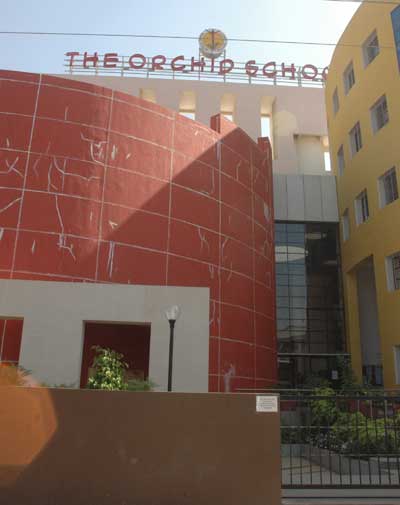 The Social Work programme at Örebro University
established an Indian-Swedish educational project in 1994.
The
SWEDEN-INDIA PROJECT, as it has been named, is characterized as an experiential, field
based training programme for culture workers – social workers,
nurses, lawyers, doctors and teachers, and Örebro University
every semester sends students of Social Work for training in India. By agreements with several other Swedish uniersities, students from the School of
Social Work at Lund University, the Mid
Sweden University in Östersund, as well as the departments
of Social Work at Stockholm University and Göteborg University,
also take part in the programme. Lund University however will not send any more students from 2008.
The Social Work programme at Örebro University
established an Indian-Swedish educational project in 1994.
The
SWEDEN-INDIA PROJECT, as it has been named, is characterized as an experiential, field
based training programme for culture workers – social workers,
nurses, lawyers, doctors and teachers, and Örebro University
every semester sends students of Social Work for training in India. By agreements with several other Swedish uniersities, students from the School of
Social Work at Lund University, the Mid
Sweden University in Östersund, as well as the departments
of Social Work at Stockholm University and Göteborg University,
also take part in the programme. Lund University however will not send any more students from 2008.
The field practice has its base
in Pune, Maharastra, India, and over the years more than 500
participants have gone through the training, that is run in collaboration with a number of private institutions in the Pune-Mumbai region.
Ms. Lakshmi
Kumar is the Coordinator-cum-Supervisor/Director for the project, based at the Orchid Scool in Pune, but she is also visiting Örebro a couple of times every year. She has a Master's Degree
in Social Work, specialised in Medical & Psychiatric Social
Work, and with a Post Graduate Diploma in Human Resource Management.
Ms. Kumar supervises the students for their three months field practice
in India comprising of study visits, seminars, individual/group
conferences and process meetings. On successful completion the
students are certified with 15 credits for their Graduate Study.
From the start of the project, Dr. Anders
Jonsson at the Dept. of Sociology, Örebro University, was the coordinator on the Swedish side. He has now, however, left the project.
In recent years, the Sweden-India Project has expanded its scope. Other Swedish academic departments have also been included, and a number of Linneaus Palme exchange programme grants for students and teachers exchange have been given. One such programme now running is between the Legal Sciences division within the Dept. of Behavioural, Social and Legal Sciences, Örebro University. The collaboration partner on the Indian side in this case is the Symbiosis
Society’s Law College in Pune.
Plans are also under way to establish collaboration agreements with the Royal Institute of Technology (KTH) in Stockholm and other Swedish universitries.
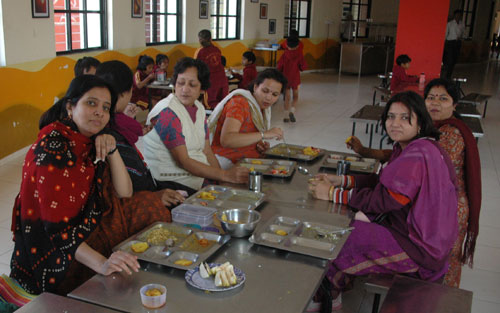 It was interesting for us to meet Ms. Kumar and the staff of the impressive school (the Orchid School) that Ms. Kumar and a group of committed educationists have established at Mhalunge Road in Baner, Pune. It is a private institution run by the Pradnya Niketan Education Society (PNES), and whose students today range from nursery school to the 5th standard. It is strikingly clean and well-managed.
It was interesting for us to meet Ms. Kumar and the staff of the impressive school (the Orchid School) that Ms. Kumar and a group of committed educationists have established at Mhalunge Road in Baner, Pune. It is a private institution run by the Pradnya Niketan Education Society (PNES), and whose students today range from nursery school to the 5th standard. It is strikingly clean and well-managed.
(Photo: Ms. Kumar and teachers eating school lunch together with the children)
The approach is holistic, focusing on the needs of the children. During our visit, Lakshmi Kumar told us that the school’s ideology is inspired by traditional Indian pedagogy, in combination with Waldorf pedagogy, and Montessori pedagogy. The monthly fee for students is Rs 2000, so it is obviously a school for children from the upper and middle classes.
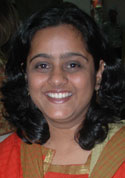 The pedagogical approach seemed quite different from many other schools, where a stricter hierarchy was in place. As an example, students addressed teachers as well as the director by their first names. The school also has a strong ideology of environmental awareness and human development. Lakshmi described their vision in the following way: “Locally Rooted and Globally Competent Education. We believe that all children can learn once they are given the opportunity in an appropriate, productive learning environment. As a result, we create a community of life-long learners through integrating student-based learning, curriculum-based learning and life experiences.”
The pedagogical approach seemed quite different from many other schools, where a stricter hierarchy was in place. As an example, students addressed teachers as well as the director by their first names. The school also has a strong ideology of environmental awareness and human development. Lakshmi described their vision in the following way: “Locally Rooted and Globally Competent Education. We believe that all children can learn once they are given the opportunity in an appropriate, productive learning environment. As a result, we create a community of life-long learners through integrating student-based learning, curriculum-based learning and life experiences.”
On the evening of November 21, the day we arrived from Mumbai, a marvellous reception and dinner in our honour was arranged within the Orchid School. Approximately fifty people persons attended. It was a great opportunity for us to meet not only Lakshmi Kumar and her close associates and staff (including Ms. Kanishka (photo to the right), who had been kind enough to finalise our programme for the three days we were going to stay in Pune), but also the board members in th trust that drives the Sweden-India Project.
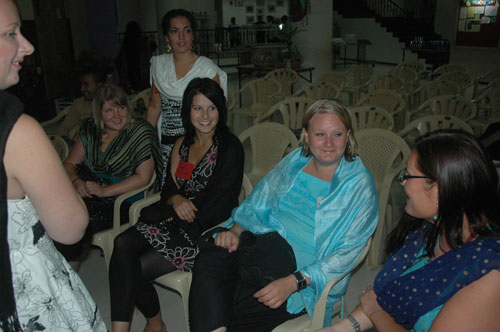 Most of the Swedish students in Social Work – from the universities of Örebro, Östersund, Stockholm, Lund and Göteborg – that had spent the autumn 2007 in India doing fieldwork within the framework of the India Project were also present, so we could discuss their experiences (some of them seen on the photo to the right). A few of them, we had actually met a week earlier in Varkala, Kerala, when they had Diwali vacations.
Most of the Swedish students in Social Work – from the universities of Örebro, Östersund, Stockholm, Lund and Göteborg – that had spent the autumn 2007 in India doing fieldwork within the framework of the India Project were also present, so we could discuss their experiences (some of them seen on the photo to the right). A few of them, we had actually met a week earlier in Varkala, Kerala, when they had Diwali vacations.
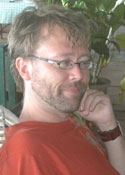 • Daniel Bengtsson (photo to the left), Lund University
• Daniel Bengtsson (photo to the left), Lund University
• Annika Pasuri, Mid-Sweden University
• Cajsa Ernholdt, Lund University
• Johan Ruhlander, Mid-Sweden University
After the many speeches, also from our side, we had good discussions with the guest to the the reception, among them:
Prof. Vikram Ghole, Dr. Alaka S. Gadhil, and PhD Candidate Arundhati Vishwarrao from the Department of Environmental Sciences, University of Pune, involved in a Linneaus Palme project with Jönköping University. We met them again the following day during our visit to their department, see our report from Pune University.
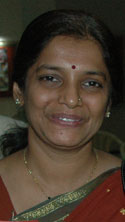 Dr. Shashikala Gurpur (photo to the right), Dean at the Faculty of Law, Symbiosis Law School – involved in Linneaus Palme project with Örebro University. Also Ms. Sujata Arya from the same institution.
Dr. Shashikala Gurpur (photo to the right), Dean at the Faculty of Law, Symbiosis Law School – involved in Linneaus Palme project with Örebro University. Also Ms. Sujata Arya from the same institution.
Mrs. Susan Raj, Consultant in HIV/Aids Projects
Mrs. Manjushree Patil, Education Consultant and Special Educator. Mrs. Patil is involved in collaboration with the Institute for Psychological Health in Thane.
Mr. Subroto Roy, Principal Correspondent, Times Response
Adv. Asim Sarode, Human Rights and Law Defenders, Pune (Adv. Sarode defends the rights of female prostitutes.)
Mr. R. Kannan, Wisdom Consulting, Pune (Mr. Kannan organises courses for Swedish companies and others that cover such issues as Indian business culture and the Indian legal system. He mentioned that staff from Atlas Copco and Sandviken have participated in these courses.)
Dr. M.G. Devamane, Principal, Sinhgad Academy of Engineering, Affiliated with University of Pune.
SASNET - Swedish South Asian Studies Network/Lund
University
Address: Scheelevägen 15 D, SE-223 70 Lund, Sweden
Phone: +46 46 222 73 40
Webmaster: Lars Eklund
Last updated
2011-02-01
